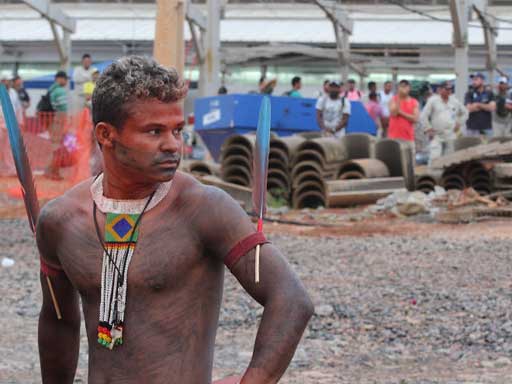Photos available upon request
Altamira, Brazil – Today some 150 protestors from four indigenous groups and allied riverbank communities occupied a major work camp and halted construction of the controversial Belo Monte Dam on the Xingu River in the Brazilian Amazon. The occupation paralyzed the project’s strategic Pimental construction site, where an earthen cofferdam traversing the Xingu River was recently completed. This is the third indigenous protest in less than a year that has halted dam construction as tensions have mounted over human rights violations, environmental impacts, devastated livelihoods and false promises made by the government-led dam consortium Norte Energia.
The occupation began at 4 am as a group of Juruna, Xipaia, Kuruaia, and Canela protestors from the Jericoá indigenous community, together with representatives of local riverbank populations, blocked an access road to the Pimental construction camp. Protestors pushed forward to occupy the camp, rejecting attempts by agents of Brazil’s National Security Force to impede their progress by demanding that they first negotiate with the company. Upon entering the camp, the group asked workers on site to leave their installations. According to protestors the workers were helpful and supported the occupation, claiming that they are working under inhumane conditions without recourse.
Indigenous protestors charge that construction of the cofferdams at the Pimental site has already had disastrous effects on the Jericoá community, located downstream on the “Big Bend” of the Xingu River. According to indigenous leaders, the quality of water has declined so drastically that the Xingu is no longer a source of potable water, and even bathing has been affected. Polluted water and explosions from dam construction have devastated fish stocks, a dietary staple and source of income for many families. While blocking off approximately 5km of the Xingu’s main channels, the Pimental cofferdams have diverted the river’s flow into a narrow channel of 450 meters, making boat transport extremely dangerous. Indigenous communities and other local populations are dependent on boat transportation for the marketing of goods and basic health and education services. A “boat transposition” system constructed by Norte Energia to supposedly address the problem has proven to be a failure.
Indigenous protestors argue that Norte Energia has systematically reneged on promises of compensation for impacts of Belo Monte. According to a statement issued today by members of the Jericoá community, “the complete lack of implementation of actions to mitigate and compensate indigenous communities for the disastrous impacts of Belo Monte shows us that the project is being constructed in complete disregard for the rule of law. The rights of traditional populations are being steamrolled in the name of profits for the dam builders. We want to make it clear that we do not accept this situation and do not believe in the vague promises of NESA and the Brazilian government, that have acted irresponsibly, using the money of taxpayers channeled through the Brazilian Development Bank (BNDES) to assassinate the Xingu and the people that depend upon the river for their survival.”
The protestors are demanding official recognition of their land rights and implementation of effective measures to mitigate and compensate Belo Monte’s impacts, including construction of wells, compensation for lost fisheries and alternative solutions for boat transportation. According to protestors, it’s likely that members of other local indigenous groups will join the occupation in the coming days.
“The protest launched today led by the Jericoá indigenous community and other riverbank populations is evidence of a much larger problem. The legally-binding conditions of the project’s environmental licenses have been continually flouted by Norte Energia and the Brazilian government,” said Maira Irigaray of Amazon Watch. “The rule of law in Brazil must be taken seriously by President Dilma Rousseff. Belo Monte should be immediately cancelled.”
“At the time of project approval, the federal government launched an expensive propaganda campaign claiming that Belo Monte would have no impact on downstream communities of the Xingu River,” said Brent Millikan, Amazon Program Director at International Rivers. “The protest of the Jericoá community and other riverbank populations is further proof of what scientific experts have said from the beginning: Belo Monte will have a profound impact on the Big Bend of the Xingu and its indigenous populations. The Federal government has been lying to the Brazilian public about Belo Monte.”














